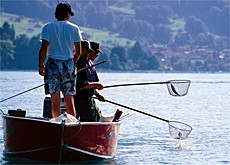Getting to the bottom of Lake Thun’s troubles

Researchers trying to establish why fish from Lake Thun are suffering deformities have embarked on a five-year study.
A first step will be a careful analysis of the water for traces of metals, and above all for any hint of TNT, which would be a strong sign that dumped munitions had begun to leak.
If any sign of leakage is found, defence department divers will be expected to go down to the site of the dump and check it.
“No pictures have been taken of the dumped munitions since the early 1990s,” admits Ueli Ochsenbein of canton Bern’s water protection office. “And they were of very poor quality, so it was hard to see what was going on.”
Meanwhile, Peter Friedli of the fishery department will be busy trying to establish or eliminate causes of the deformities in the fish.
‘Fry’ or young undeveloped fish from lake Thun will be released into other Swiss lakes and their growth monitored. Conversely, fry from lakes where no problems have been found will go into lake Thun to see if they subsequently develop abnormalities.
“What we need to establish is what makes lake Thun different from other Swiss lakes,” Friedli said.
Fishing with hope
While the greatest suspicion rests on the ageing munitions, Friedli, Ochsenbein and Hans Stücki of the defence department also speculate that blasting in the Kander valley to create new alpine tunnels could also be responsible.
“The construction of the tunnels began around 1999,” Friedli explained. “Water from the river Kander ends up in Lake Thun, and we first began seeing abnormalities in the fish in 2000.”
For fishermen like Alex Schwab, the five years of the research programme is a long time to wait to find out exactly what’s gone wrong in Lake Thun, and he would prefer the army to act now.
“Even if the munitions are not the cause of the problems with the fish,” he said, “the fact is they should not be there. I think the army could really improve its image, and present itself in a positive light, if they were seen to be doing something about it now.
“I think they have understood that they’ve got an enormous problem on their hands, now they have to understand that they have to act quickly.”
For the time being, Schwab continues to fish in what he regards as Switzerland’s most beautiful lake, and, he says, he’s still eating his catch.
“I still say Lake Thun fish are the best white fish in the world,” he said. “And I’m still eating them – I’m eating them with hope.”
swissinfo, Imogen Foulkes in Thun

In compliance with the JTI standards
More: SWI swissinfo.ch certified by the Journalism Trust Initiative
You can find an overview of ongoing debates with our journalists here. Please join us!
If you want to start a conversation about a topic raised in this article or want to report factual errors, email us at english@swissinfo.ch.